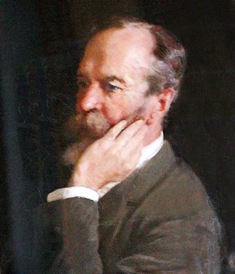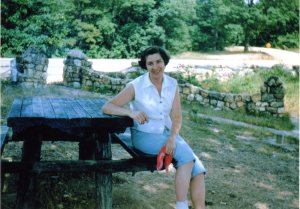“Some emotions make us flourish, others sap our well-being, others make us wither.”
No kidding. I’ve been talking up the positive emotions, and so does Ricard just a few paragraphs on: “positive emotions broaden our thought-action repertoire” to include joy, interest, contentment, and love.
Great. But a friend reports his 10-year old daughter’s recent diagnosis of Type 1 diabetes, and the attendant emotions are just as you’d expect: “feeling stuck, tired, angry, & not much fun to be around.” I have a 10-year old too, I’m sure I’d be every bit as demoralized and debilitated by that news as he is. There are moments in life when overt demands to flourish ring false.
I’m not about to advise my friend to buck up and be happy. That would be insensitive and probably counter-productive. But I wonder if I’d be able to tell myself that, were we to find ourselves in his family’s situation.
Ricard mentions William James’s concept of “sustained, voluntary attention“– the key, for James, to free will, self-determination, and ultimately to happiness itself. (Winifred Gallagher just wrote a great big book on this.) When life snaps you over the head with a two-by-four, can you still turn your attention away from “disturbing” emotions to positive, nurturing thoughts? I know, Buddhist meditators can do it for hours on end. But Buddhist meditators, afflicted by many forms of suffering and denial, still tend not to have 10-year olds with Type 1 diabetes. Or is that an outworn, culturally-confused stereotype?
Maybe it is. Buddhists in America especially come in all shapes, sizes, and domestic situations. But I’m afraid the “calming” exercise in this chapter is not a lot more specifically instructive to me than the earlier advice to expand my mind. “With a deep feeling of appreciation, think of the value of human existence and of its extraordinary potential for flourishing. Be aware, too, that this precious life will not last forever…” Carpe diem? Memento mori? I think Hallmark could do better.
In general I have nothing but admiration for such sentiments, which come to me in almost precisely this form and with some considerable frequency– usually on sunny days when I’ve placed myself in my own form of meditative receptivity, while hoofing it around and watching the thoughts rise and fall.
What I still want to understand is how Buddhists and other serene folk summon such comfort and joy when the days and nights are dark and long and the news is heartbreaking. We’re passionately “attached” to our children, we grieve when they suffer, we curse the impersonal universe that dispenses weal and woe so indifferently, and at such moments feel anything but appreciation for life’s maldistributed “potential.” (Is that what Heidegger meant by “presence in the mode of absence?”) At such moments, what we want is to be dealt a new hand… not to be urged to be effusively grateful for the crummy old one.
And we’re going to need a better “exercise,” there’s not much consolation in this one.
Chapter Ten, to Ricard’s credit, picks up the challenge. “There’s no question here of ceasing to love those whose lives we share.” No, there’s not.
“As for anger, it can be neutralized by patience.” Again, details here are wanting. But this is key, if only I could figure out how to make it fit my psychological locks: “You are overwhelmed by a sudden tide of anger… But look closely. It is nothing more than a thought… It is a temporary condition, and you do not need to identify with it.”
But when conditions objectively “suck,” as my friend observes, shouldn’t we identify with the emotions that express our sharp revulsion? It feels like the right response–not the most pleasant, not the happiest, not the healthiest, just the right one. Why is that wrong? Why are we entitled to stuff those emotions and opt for the positive ones, when conditions do not elicit them spontaneously?
Of course, liberation from anger at the moment it arises would be wonderfully soothing– to me. It would not mitigate a little girl’s anguish, would it?
But is the point, rather, that even righteous anger does no good and might do harm? That begins at last to speak to me, as did the Oklahoma City Dad’s refusal to endorse Timothy McVeigh’s execution (ch12). One more death, one more angry act of retribution, eases no one’s pain. “An eye for an eye, a tooth for a tooth” leaves us all blind and gummy.
Once again, though, the exercise does not work for me. “Don’t unite with the anger… keep on just observing [it], it will gradually evaporate under your gaze.” Yes, eventually we’ll all evaporate. Just now, though, when the anger is a tight little knot and the world does not feel much like home, is observation the best response? It might be. But it feels like a waste of perfectly good adrenaline.
 Ricard quotes “the great pessimist Arthur Schopenhauer,” and his coupling of striving and desire. The
Ricard quotes “the great pessimist Arthur Schopenhauer,” and his coupling of striving and desire. The  implication is that desire always frustrates, is “everywhere impeded,” always struggling, fighting, suffering. We can escape desire, or suppress it. But Mark Twain said the best way to conquer temptation is to yield to it. Is that not, sometimes, a gratifying strategy? (I don’t know what Shania says about desire, that’s whose image Google wanted me to put here. You prob’ly did too.)
implication is that desire always frustrates, is “everywhere impeded,” always struggling, fighting, suffering. We can escape desire, or suppress it. But Mark Twain said the best way to conquer temptation is to yield to it. Is that not, sometimes, a gratifying strategy? (I don’t know what Shania says about desire, that’s whose image Google wanted me to put here. You prob’ly did too.)
As for dismantling hatred and hostilities: Buddhists and cheek-turning Christians have much to teach us all about this. I confess I simply do not comprehend the sensibility that is capable of feeling love and compassion for even the most hateful and hostile others, simply because they too “strive to achieve happiness and avoid suffering.” I suppose I am deficient in fellow-feeling. I hope I would refrain from calling for Tim McVeigh’s head, but I don’t feel bad about not extending to him the love and compassion I feel for my kids. Should I? Please explain.
My reflections on this book began with some quibbles about renunciation. Ricard is explicit, now, in denying my presuppositions: “Renunciation is not about depriving ourselves of that which brings us joy and happiness… saying no to all that is pleasant… Genuine happiness– as opposed to contrived euphoria– endures through life’s ups and downs.” And smooths them out? “We can get off the endless roller coaster of happiness and suffering.” That’s fine, I’m not that fond of roller coasters anyway. And I’m very fond of Ricard’s next authorial citation: “Simplify, simplify.”
But I still think William James has had the sharpest insight into our correct default position on the question of desires: fulfill as many of them as we can, erring on the side of the presumption that more (not fewer) satisfactions will raise the sea level of our happiness.
 “Take any demand however slight, which any creature, however weak, may make. Ought it not, for its own sake, to be satisfied? If not, prove why not. The only possible kind of proof you could adduce would be the exhibition of another creature who should make a demand that ran the other way. The only possible reason there can be why any phenomenon ought to exist is that such a phenomenon actually is desired. Any desire is imperative to the extent of its amount; it makes itself valid by the fact that it exists at all.” The Moral Philosopher and the Moral Life
“Take any demand however slight, which any creature, however weak, may make. Ought it not, for its own sake, to be satisfied? If not, prove why not. The only possible kind of proof you could adduce would be the exhibition of another creature who should make a demand that ran the other way. The only possible reason there can be why any phenomenon ought to exist is that such a phenomenon actually is desired. Any desire is imperative to the extent of its amount; it makes itself valid by the fact that it exists at all.” The Moral Philosopher and the Moral Life
Is this wrong? If you read it as an excuse for narcissistic, ego-grabbing, non-reciprocal, non-altruistic selfishness, read on:
“Were all other things, gods and men and starry heavens, blotted out from this universe, and were there left but one rock with two loving souls upon it, that rock would have as thoroughly moral a constitution as any possible world which the eternities and immensities could harbor. It would be a tragic constitution, because the rock’s inhabitants would die. But while they lived, there would be real good things and real bad things in the universe; there would be obligations, claims, and expectations; obediences, refusals, and disappointments; compunctions, and longings for harmony to come again, and inward peace of conscience when it was restored; there would, in short, be a moral life, whose active energy would have no limit but the intensity of interest in each other with which the hero and heroine might be endowed. We, on this terrestrial globe, so far as the visible facts go, are just like the inhabitants of such a rock.”
Our emotions and desires need not pull us apart. They can bring us together, here at The Rock. We just gotta follow the rules, keep our cool, resist pointless anger, and practice a little tough love (as well as loving-kindness) with the rule-breakers. Don’t be spiteful and immature. (And, don’t get a swell-head like Goob did once.) Ol’ Barn had it all figured out. “Frood wrote a book about it, Andy.”
keep our cool, resist pointless anger, and practice a little tough love (as well as loving-kindness) with the rule-breakers. Don’t be spiteful and immature. (And, don’t get a swell-head like Goob did once.) Ol’ Barn had it all figured out. “Frood wrote a book about it, Andy.”
 Ricard quotes “the great pessimist Arthur Schopenhauer,” and his coupling of striving and desire. The
Ricard quotes “the great pessimist Arthur Schopenhauer,” and his coupling of striving and desire. The  implication is that desire always frustrates, is “everywhere impeded,” always struggling, fighting, suffering. We can escape desire, or suppress it. But Mark
implication is that desire always frustrates, is “everywhere impeded,” always struggling, fighting, suffering. We can escape desire, or suppress it. But Mark  “Take any demand however slight, which any creature, however weak, may make. Ought it not, for its own sake, to be satisfied? If not, prove why not. The only possible kind of proof you could adduce would be the exhibition of another creature who should make a demand that ran the other way. The only possible reason there can be why any phenomenon ought to exist is that such a phenomenon actually is desired. Any desire is imperative to the extent of its amount; it makes itself valid by the fact that it exists at all.”
“Take any demand however slight, which any creature, however weak, may make. Ought it not, for its own sake, to be satisfied? If not, prove why not. The only possible kind of proof you could adduce would be the exhibition of another creature who should make a demand that ran the other way. The only possible reason there can be why any phenomenon ought to exist is that such a phenomenon actually is desired. Any desire is imperative to the extent of its amount; it makes itself valid by the fact that it exists at all.”  keep our cool, resist pointless anger, and practice a little tough love (as well as loving-kindness) with the rule-breakers. Don’t be
keep our cool, resist pointless anger, and practice a little tough love (as well as loving-kindness) with the rule-breakers. Don’t be  But maybe there’s room on the shelves for one more of these Daddyographies. I’ve also noted a gap “between the idea of fatherhood and a man’s actual experience of it.” Lewis has inspired me to hunt up those notes. But it might be better to just start scribbling some fresh observations, with the kids on the respective cusps of Middle and High School. They’ll love me for that!
But maybe there’s room on the shelves for one more of these Daddyographies. I’ve also noted a gap “between the idea of fatherhood and a man’s actual experience of it.” Lewis has inspired me to hunt up those notes. But it might be better to just start scribbling some fresh observations, with the kids on the respective cusps of Middle and High School. They’ll love me for that! It is a happy anniversary, I do have vivid and pleasing memories of events during the first week of June, in that first summer of the Clinton presidency. One stands out, or soars over: flying high over Captiva Island and the Gulf of Mexico, at the end of a very long tether secured firmly (I hope!) to a speeding boat. It was a great thrill, of the type that I habitually, reflexively resist in my constant, mostly-successful quest to avoid significant personal injury. That day, though, it seemed like the right thing to do. Marriage was a serious proposition, fraught with risk, but also intoxicating in its promise of life-transforming possibility. We were looking, or I was, for symbolic punctuation of the high-wire act that brings two kindred, but also stubbornly-distinctive spirits together and impels them to exchange sacred vows of mutual trust and commitment before friends and family (it was the last time Mom and Dad, then already long apart, were together in public). Philippe Petit being unavailable, parasailing seemed the perfect symbol of our connubial future. Controlled, but potentially dangerous. And thrilling to anticipate.
It is a happy anniversary, I do have vivid and pleasing memories of events during the first week of June, in that first summer of the Clinton presidency. One stands out, or soars over: flying high over Captiva Island and the Gulf of Mexico, at the end of a very long tether secured firmly (I hope!) to a speeding boat. It was a great thrill, of the type that I habitually, reflexively resist in my constant, mostly-successful quest to avoid significant personal injury. That day, though, it seemed like the right thing to do. Marriage was a serious proposition, fraught with risk, but also intoxicating in its promise of life-transforming possibility. We were looking, or I was, for symbolic punctuation of the high-wire act that brings two kindred, but also stubbornly-distinctive spirits together and impels them to exchange sacred vows of mutual trust and commitment before friends and family (it was the last time Mom and Dad, then already long apart, were together in public). Philippe Petit being unavailable, parasailing seemed the perfect symbol of our connubial future. Controlled, but potentially dangerous. And thrilling to anticipate.
 you can look after and find bugs and seeds for;
you can look after and find bugs and seeds for; 

 You’ve been gone for over a year now. I owe you a call.
You’ve been gone for over a year now. I owe you a call. For all the Moms in my life: step-Mom, Mom-in-law, wife, friends: please, share the roses.
For all the Moms in my life: step-Mom, Mom-in-law, wife, friends: please, share the roses.